Founded by a modest hermit, Saint-Emilion’s history stretches back for 13 centuries. Famous and most known for the Saint-Emilion wines that comes from this appellation in the Bordeaux wine region, a day trip to Saint-Emilion from Bordeaux is on nearly every visitor to the region’s must-do list. But practically an outdoor museum itself, this village carved out of the limestone and perched dramatically on a promontory deserves more exploration than you could ever possibly see in just a day trip.
You can easily spend a few days soaking up one of the prettiest villages of France and discovering the nearly 1000 châteaux of Saint-Emilion. As Bordeaux locals, we spend a lot of time in Saint-Emilion. Follow our 3-day Saint-Emilion itinerary to discover some of the best this village and wine appellation have to offer, along with a few secrets only locals know.
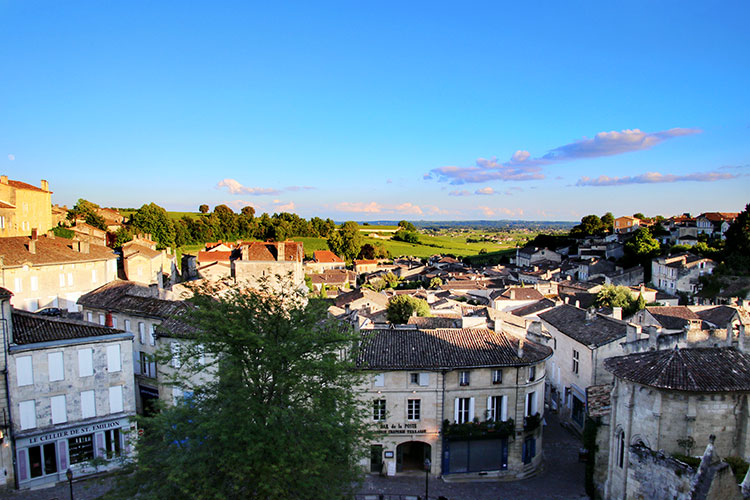
Day 1: Discover the Village of Saint-Émilion
Saint-Émilion has been inhabited since Roman times. The village gets its name from a hermit, Émilion, who arrived in the 8th century and decided to devote himself to prayer. At the time Émilion arrived, the village was called Ascumbas. It was after Benedictines followed him that a large monastic city grew from the first religious community under Émilion, and his followers renamed the village to Saint-Émilion in homage.
An almost cult-like following of various religious groups that included the Benedictines, Augustinians, Franciscans, Dominicans and Ursulines all came and lived harmoniously together in Saint-Émilion between the 8th and 18th centuries. It is they that built the wonderful monuments we still see today.
Though the entire village is like an outdoor museum with layers of history spanning 13 centuries, there are several monuments you simply must discover. You can either book a guided walk in the Saint-Émilion Tourism office, or you can slowly discover the monuments on your own.
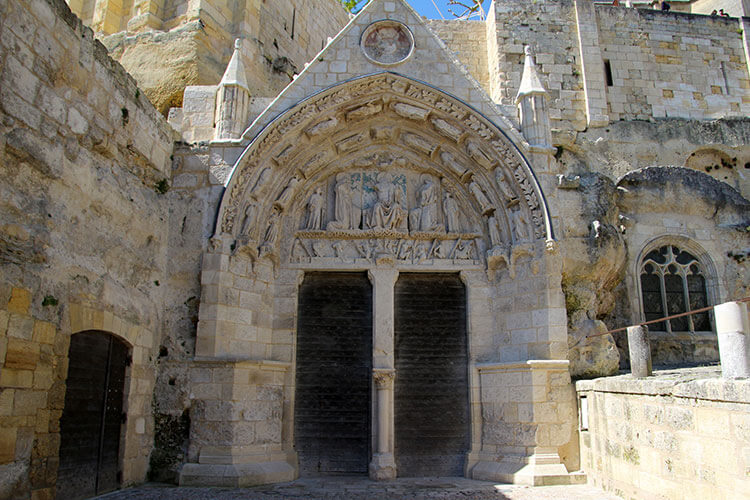
The Monolithic Church of Saint-Emilion
If you only visit one monument in the UNESCO village, it must be the Monolithic Church. Dug out from the limestone in the 12th century, the Monolithic Church is the largest of its kind in Europe. The massive church begins several stories below the surface of what we see today, and it can only be visited on a guided tour.
Monolithic, from the Greek mono meaning single and lithos meaning stone, it was impressively carved out of a single block of stone on the Saint-Émilion plateau. Inside you won’t believe the painted murals or just the sheer scale. You’re not allowed to take photos or videos inside in order to help preserve this part of history, so you’ll just have to visit for your self to see just how truly awe-inspiring it is.
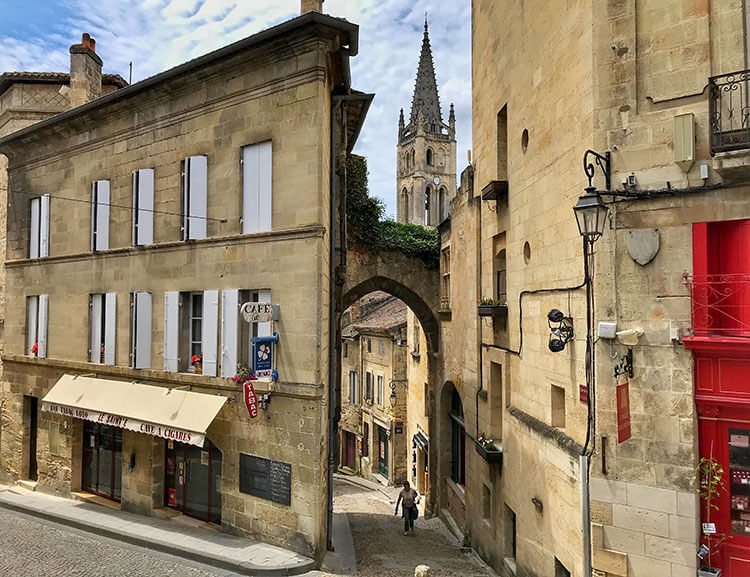
Porte de la Cadéne
Saint-Émilion was a fortified town and has several gates leading in to the village. Without a doubt, the Porte de La Cadène is the most beautiful. The arched gateway is a perfect frame for the 68 meter high bell tower topping the Monolithic Church. The gate is situated at the top of an incredibly steep cobbled lane called a tertre, connecting the upper and lower towns.
And the Maison Cadène sits just inside the gate. It’s a house dating from the 16th century, and the only timbered building left in Saint-Émilion. Look for the sculptures adorning the bottom of the house. Time and the elements have taken their toll, but see if you can find the bunch of grapes. They’re just one of many references to Saint-Émilion’s long wine making heritage you’ll find throughout the village.
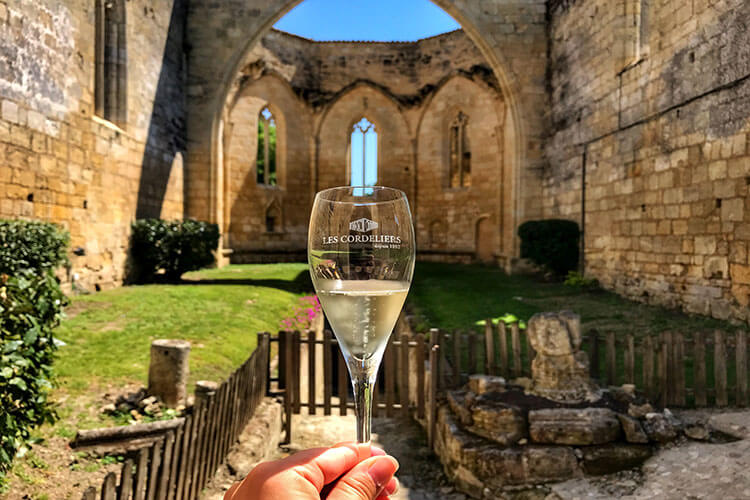
The Cordeliers Cloister
Saint-Émilion might be famous for its red wines, but Crémant de Bordeaux has been produced 17 meters beneath the Cordeliers Cloister since 1892. The former quarries snaking below the 14th century cloister are perfect for aging Bordeaux’s sparkling wine in the Champagne method.
It’s free to enter the cloister to have a look around at the beautiful courtyard and garden behind. You can also order glasses of either white or rosé Crémant de Bordeaux to enjoy in the stunning garden that feels hidden away from the rest of the bustling village.
If you want to learn more about how the Crémant de Bordeaux is produced and see the tunnels where the sparkling wine ages, you can book a guided walking underground tour to take you down. And on a hot summer day, the constant 12°C temperature of the tunnels is a welcome respite. Of course, a tasting of a refreshing glass of Crémant is the perfect way to end this visit.
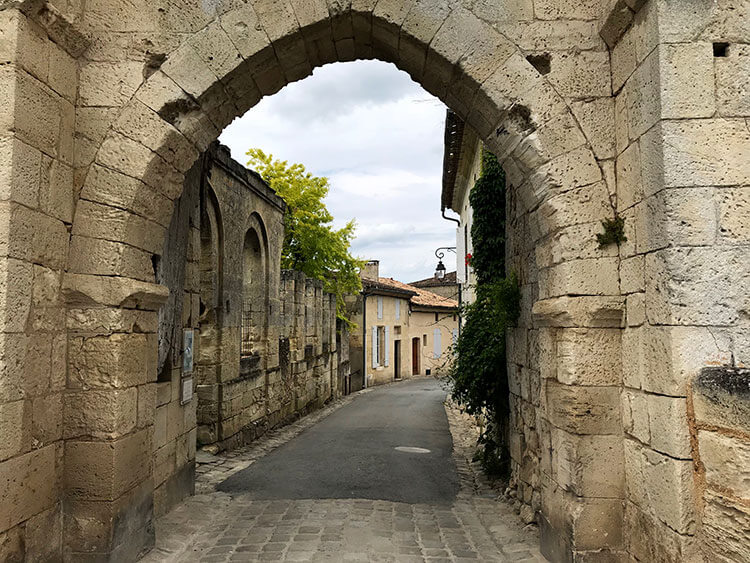
Porte Brunet and the Ramparts
After leaving the Cordeliers Cloister, walk along the streets of the upper town toward the Porte Brunet. It’s at this gate that you can still see some of Saint-Émilion’s fortifications. They were once connected by six gates and several defensive towers.
The ramparts were ordered by England in the 12th century, more as a show of Saint-Émilion’s prestige than out of a need to protect it. But even so, anyone entering the village had to pay a tax at one of the six various gates. Most of the ramparts were later destroyed in the 16th and then 19th centuries.
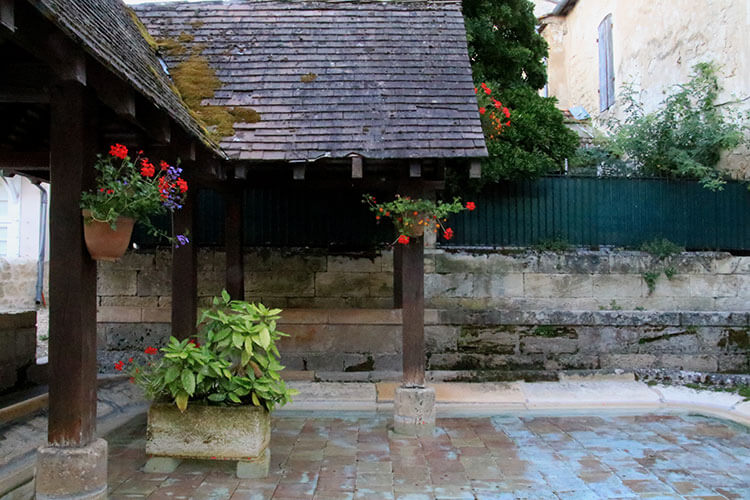
The Wash Houses
Entering Saint-Émilion from the Porte Brunet, you can follow the road down to the lower town. It’s here, beneath the King’s Keep, where you find two wash houses. They’re fed from the natural water sources that supplied many of the wells and fountains of the village.
Contrary to popular belief, the women didn’t actually bring their linen here to wash it. Instead, they brought it after it had been washed to rinse it out in the clear water of the wash houses. They were also a social affair where meetings and catching up took place.
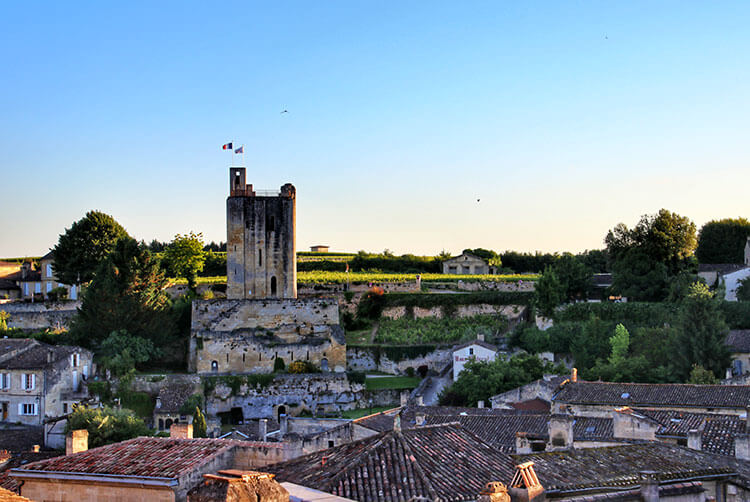
La Tour du Roy (The King’s Keep)
It’s just a short, albeit steep climb up to La Tour du Roy (or the King’s Keep) from down at the wash houses. It’s the only Romanesque keep still intact in the Gironde department.
The date of the tower’s construction is a bit of a debate. Some say it was Louis VIII who ordered it built after conquering part of the Aquitaine in 1224. Others have found it written in texts that it was Henri III Plantagenêt, the King of England and Duke of Aquitaine, that ordered it built in 1237 after Saint-Émilion came under English rule.
No matter who actually ordered La Tour du Roy, one thing can’t be disputed. Climbing the 118 steps to the top affords a spectacular view over Saint-Émilion and the vineyards beyond.
Perhaps that is why the Jurade, the brotherhood of Saint-Émilion wine, still uses the King’s Keep today. The harvest doesn’t officially being in Saint-Émilion until the Jurade have ascended the tower and announced the start each year.
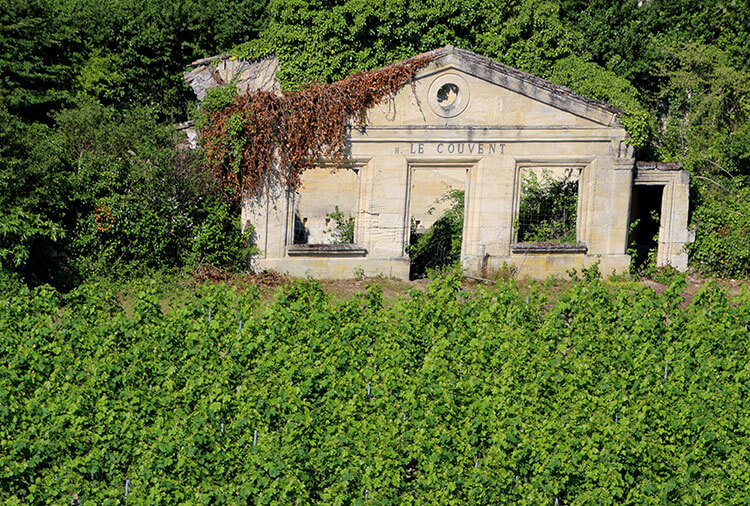
The Ursuline’s Convent
Saint-Émilion had many religious groups that settled in the village throughout its history. The order of the sister of Saint Ursule settled in Saint-Émilion on June 1, 1620. You can easily see the now-crumbling convent from atop La Tour du Roy.
The convent housed 18 nuns and their main objective was to offer free schooling to the girls of the village who couldn’t afford education. Over the three years that the convent operated the school, the nuns managed to educated some 80 girls.
The convent remained until the French Revolution, when it – along with many other churches, monasteries and convents – was seized by the government. It was abandoned and the convent has gradually fallen into ruin ever since.
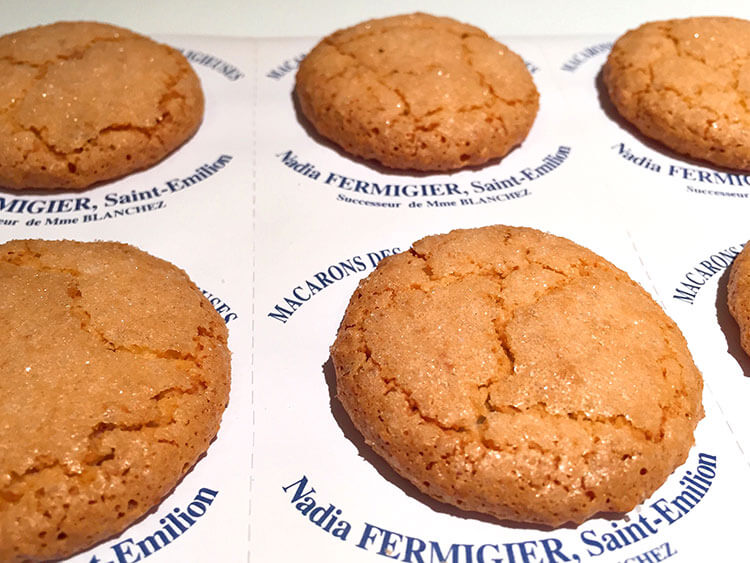
The memory of the Ursuline nuns definitely lives on in Saint-Émilion, though. It was the Ursuline nuns that made the recipe of the Saint-Émilion macaron. A recipe much older than anything you’ll find at Ladurée, these macarons are a simple tradition of Saint-Émilion for more than 400 years.
Luckily, the recipe was saved after the French Revolution. The family that inherited the recipe was given the sole right to produce the macarons.
Today you’ll find the unmistakable blue and white box with the macarons on the sheets inside by Nadia Fermigier. They are something you simply must try while visiting Saint-Émilion.
The Bell Tower of the Monolithic Church
If you still have a bit of energy, make your last stop on your tour of Saint-Émilion’s monuments the bell tower of the Monolithic Church. The climb up the 196 steps to the top is worth the unparalleled view over all of Saint-Émilion.
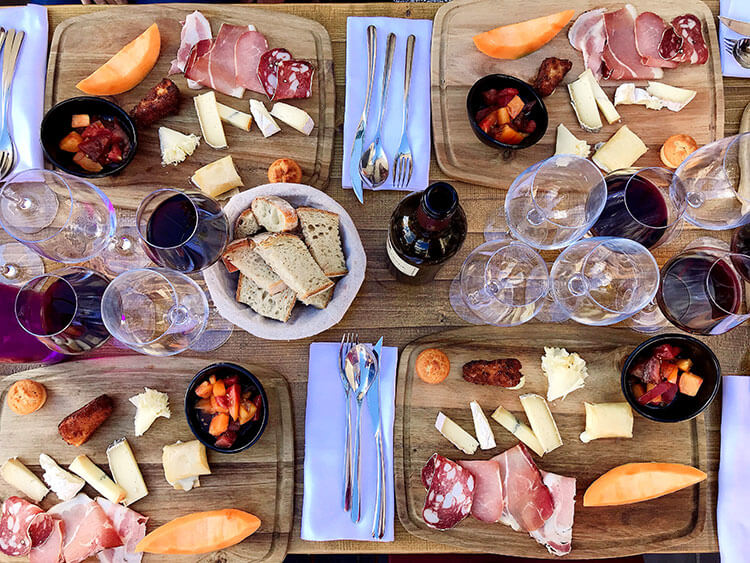
Dinner at Le Bis by Baud et Millet
Some of the most indulgent things in France are simply wine and cheese. Baud et Millet, a Bordeaux institution since 1986, knows exactly that. They’ve recently opened a Saint-Émilion location: Le Bis by Baud et Millet.
Baud et Millet knows cheese. Their Bordeaux location has a cave with 110 PDO cheeses from all around France, and plenty of wine selections to pair with them – some 900 wine references to be exact. This is where you come with no fear of judgement when all you want to do is eat cheese and drink wine.
While Le Bis by Baud et Millet doesn’t have a cave, it does have a cheese cupboard with 50 different PDO cheeses from all around France. And though you might think a meal of all cheese sounds a bit heavy for a hot summer day, we assure you this is a perfect meal for your first night in Saint-Émilion.
Leave the heavy and hearty cheeses like a fondue meal or a Mont d’Or for a return trip to Bordeaux in winter, and choose a discovery platter. You’ll enjoy a selection of cheeses along with seasonal dishes like the Marmande tomato salad, melon and charcuterie we enjoyed on a hot summer evening.
Le Bis by Baud et Millet, 49 Rue Guadet. Reservations recommended and can be made online.
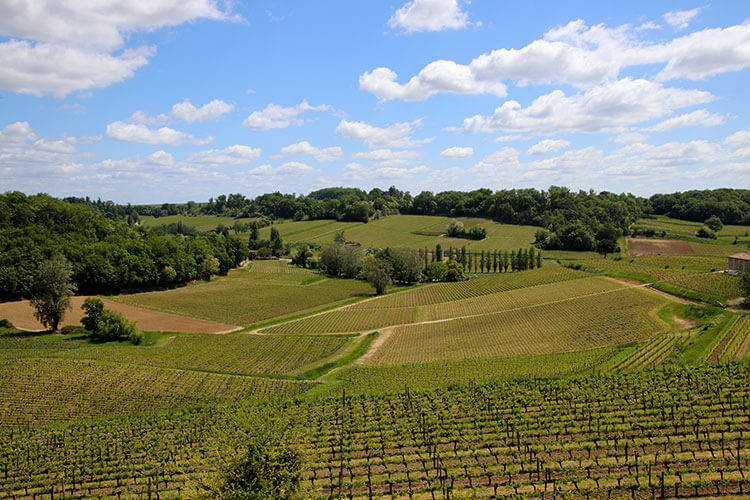
Day 2: Day out in the Vineyards
Saint-Émilion has an exceptional wine making heritage that dates back to the Romans. This heritage helped the vineyards and eight villages and communes that make up the Jurisdiction of Saint-Emilion to earn a place on the UNESCO World Heritage list in 1999 as a “cultural landscape”. It was the first time UNESCO included vineyards themselves as part of the UNESCO World Heritage list.
The medieval village sits up on what is known as the plateau, and vineyards gentle roll down the hillsides descending from the village. It’s one of the most beautiful areas to discover in Bordeaux, and spending time in the vineyards is a highlight of any visit to Saint-Émilion.
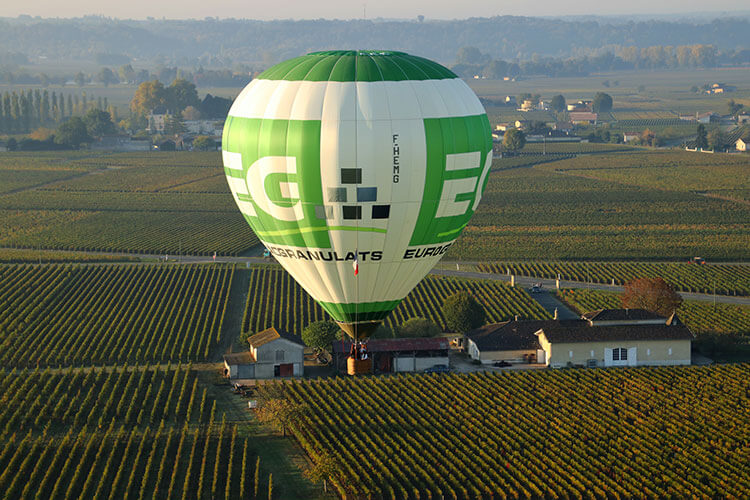
Hot Air Ballooning in Saint-Émilion
One of the most beautiful ways to take in the landscape of Saint-Émilion is from above. A hot air balloon flight over Saint-Émilion offers a birds-eye view over the vineyards and the medieval village.
With more than 1000 châteaux dotting the Saint-Émilion landscape, vines stretch in every direction as far as the eye can see. The Dordogne River snakes along the edge of the appellation. There’s hardly a more surreal scene than taking it all in as the sun peeks above the horizon.
It’s an intimate experience with La Ferme du Ciel, with their baskets accommodating 2-4 passengers. The smaller balloon size also allows them to take off right from the vineyards and land among them.
A vineyard picnic awaits as your balloon team deflates and packs up the hot air balloon at your landing site. It’s definitely worth the early morning wake-up call for this special Saint-Émilion experience.
La Ferme du Ciel offers balloon flights over the vineyards of Saint-Émilion year round (weather permitting). If your group is larger than 4 people, they can accommodate you with multiple balloons for the flight. They will pick you up within 20 kilometers of Saint-Émilion.
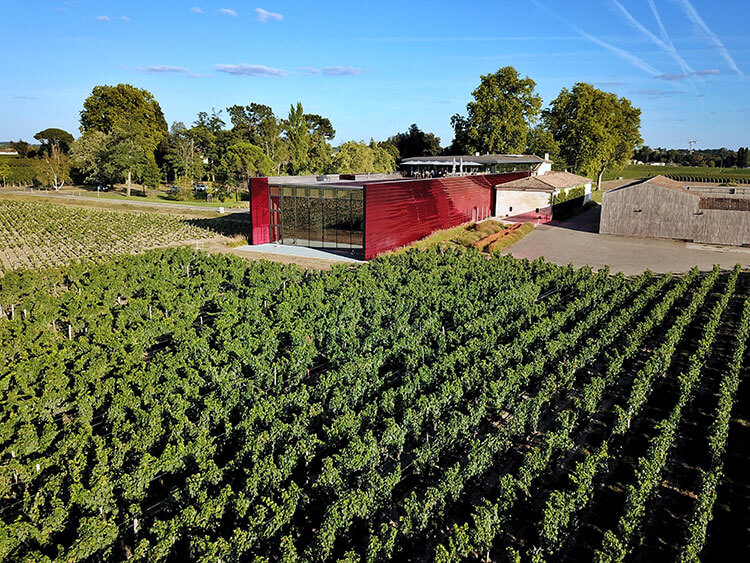
Tour Cháteau La Dominique and Lunch at La Terrasse Rouge
Château La Dominique, a Saint-Émilion Grand Cru Classé winery, sits on the edge of the Pomerol and Saint-Émilion appellations. Their shiny ombre-red winery is an eye-catcher in a sea of green vines, and the château has won the Best in Wine Tourism for its modern architecture.
The classic visit here focuses a lot on the beautiful architectural details that the owner incorporated into wine making. And temporary art exhibitions are housed throughout spaces like the vat room and barrel room during the quieter summer months when everything is happening out in vineyard.
Of course, a visit ends with a tasting of two wines of the château. It’s a lovely château to visit unique from many of the other castles typically found around Saint-Émilion.
One of the highlights is the rooftop of the red winery. It’s a rooftop terrace with the gourmet restaurant aptly named La Terrasse Rouge. Built to look like a vat of grapes just after the harvest, the stones reflect the shades of the grapes you’ll find in the vineyard as they’re ready to be picked.
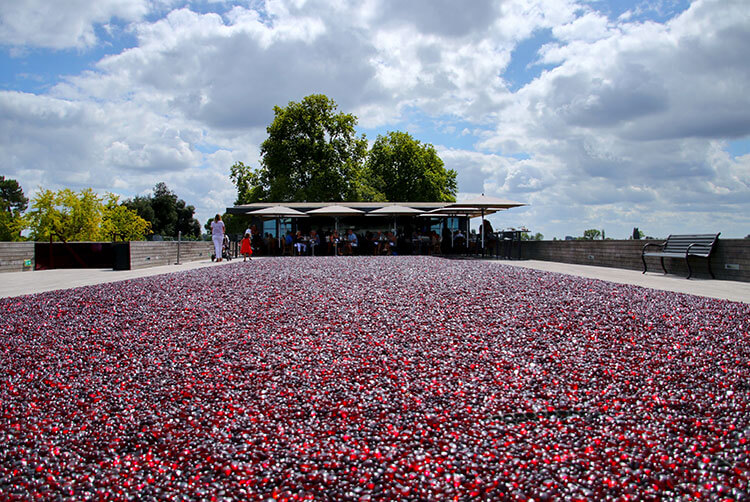
It’s one of the best restaurants in Saint-Émilion, and we think La Terrasse Rouge is best enjoyed at lunchtime for the spectacular view. Vines stretch out in every direction and famous neighbors like Château Cheval Blanc and Château Pétrus make for a memorable setting.
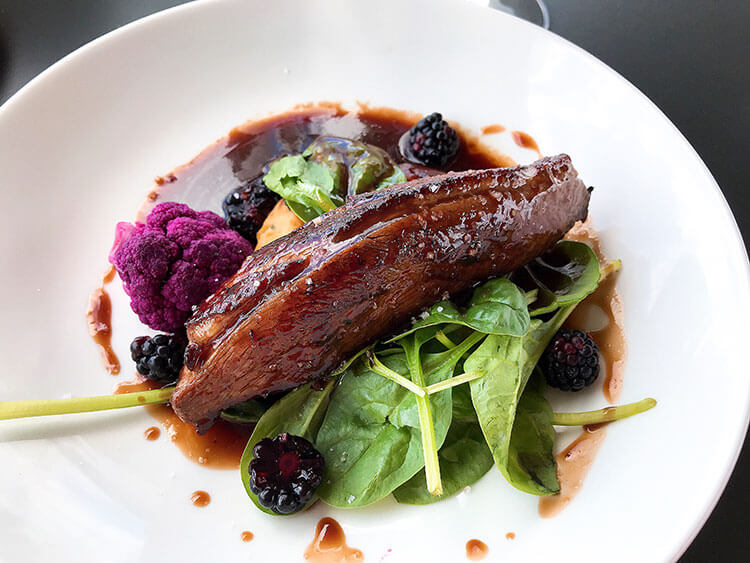
The 3-course menu is good value, or select from the a la carte menu for something a little lighter than a full meal. There’s a wide selection of wines from all around Bordeaux and the wait staff happily make pairing suggestions.
Château La Dominique is open daily from April – October and Tuesday – Saturday from November – March. The Classic Visit is strongly recommended to book in advance and all other visits like the Private Tour, Prestige Tour and Wine & Flavors Tour must be booked in advance. You can book online. La Terrasse Rouge is open daily for lunch and dinner. Lunch service is from 12-3pm and dinner service is from 7-10:30pm. Reservations highly suggested.
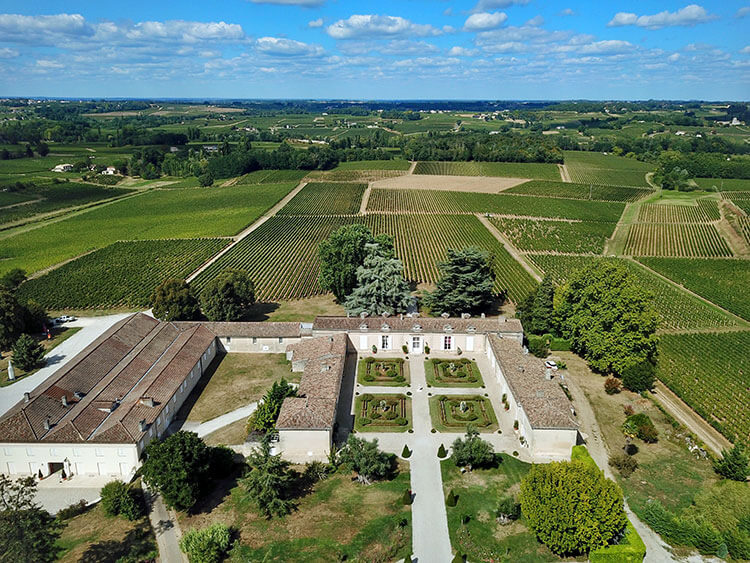
Blend Your Own Bottle of Bordeaux at Château Fombrauge
If you’ve ever dreamed of being a wine maker, you can put your wine making skills at Château Fombrauge in their B.Winemaker workshop. Not only will you take home your own unique bottle of Bordeaux wine, you’ll visit one of the oldest châteaux in the Saint-Émilion appellation.
Château Fombrauge dates back to at least 1466, when records indicate vines were planted on the site. Award-winning wines have been produced at Château Fombrauge since 1867, when the château won a gold medal at the World’s Fair in Paris. The Saint-Émilion Grand Cru Classé château has been owned by wine magnate Bernard Magrez since 1999.
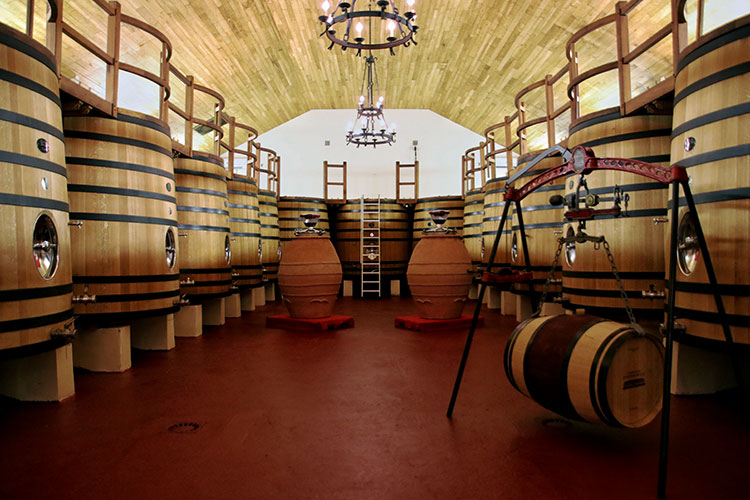
It’s an impressive château to visit with modern technology like the use of drones and robots woven with traditional methods like hand harvesting. The winery is beautiful, and the visit combined with the B.Winemaker workshop is among the most unique wine experiences in Bordeaux.
The workshop is like a fun trip back to the days of science classes, only this time your graduated cylinders are filled with wine. With expert guidance, you’ll blend Merlot and Cabernet Sauvignon to make your own personalized blend. Then bottle, cork, cap and label it to take home for a special souvenir you can enjoy with friends back home.
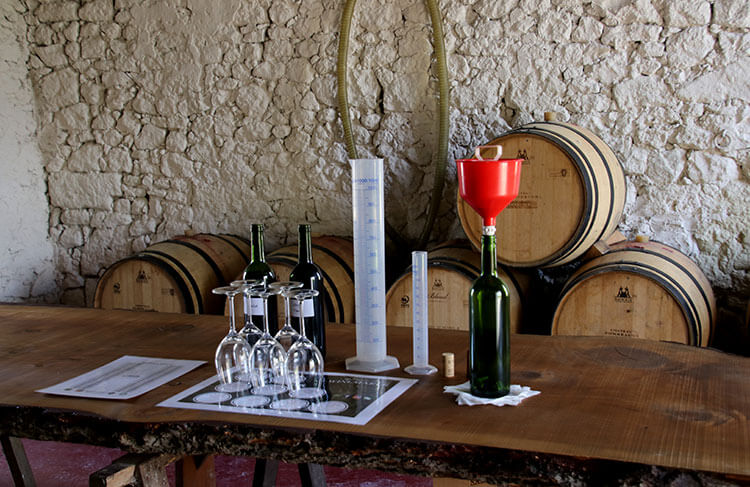
Château Fombrauge is open daily from 11am – 6:30pm. Visits and the B. Winemaker Workshop must be booked in advance and you can book online on Rue des Vignerons, but the boutique is open to visitors stopping in.
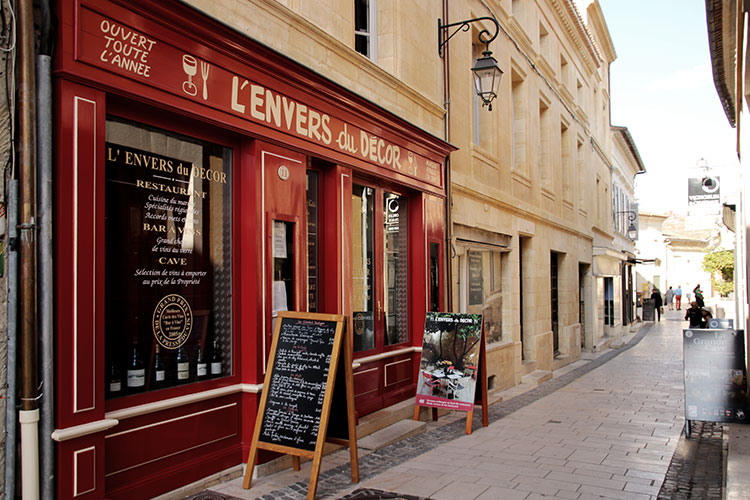
Dinner at L’Envers du Décor
Perhaps one of the best known restaurants in Saint-Émilion, L’Envers du Décor has been part of the medieval village for more than 30 years. The restaurant is owned by the same family that owns the Saint-Émilion Grand Cru Classé Château Pavie.
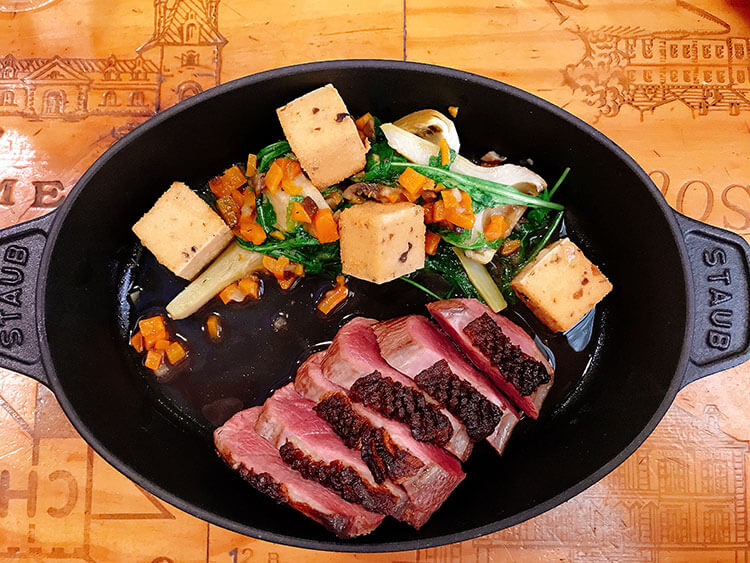
You’ll find a menu featuring local cuisine. The menu changes seasonally to highlight the freshest seasonal ingredients available from the region. Don’t skip dessert, especially if they have the soufflé. You’ll most certainly walk off every calorie consumed in Saint-Émilion, and you’re on holiday.
L’Envers du Décor, 11 Rue du Clocher. Reservations recommended. English is spoken at the restaurant.
Day 3: A Sunday Ride and Brunch in the Vineyards
Long gone are the days when Bordeaux was considered stuffy and only a place for the most discerning of wine connoisseurs. These days there’s plenty of unique ways to discover the vineyards, and they’re far from boring. You’ll make everyone back home jealous while indulging in the famous French joie de vivre, or art of living, as you end your visit to Saint-Émilion in some truly memorable ways.
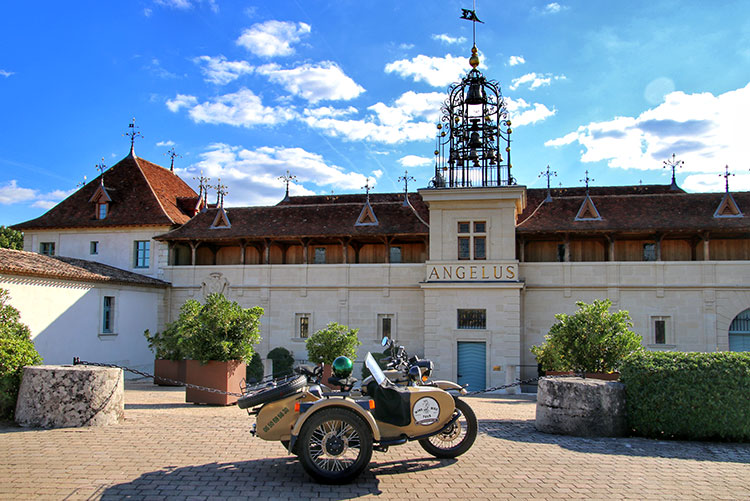
A Sidecar Motorcycle Ride through the Vineyards
Setting foot in Saint-Émilion already makes you feel like you’re stepping back in time. Hopping on a vintage sidecar motorcycle for a tour through the vineyards is the perfect way to end a visit to this world-class wine appellation.
You can be picked up from your hotel in the retro off-road ready sidecar motorcycle. The 90-minute tour zips up and down the winding, narrow roads right through the heart of Saint-Émilion vineyards and past some of the most beautiful châteaux like Château Angélus and Château Ausone. There’s several stops for photo ops in front of some of the beautiful châteaux not open to the public for visits.
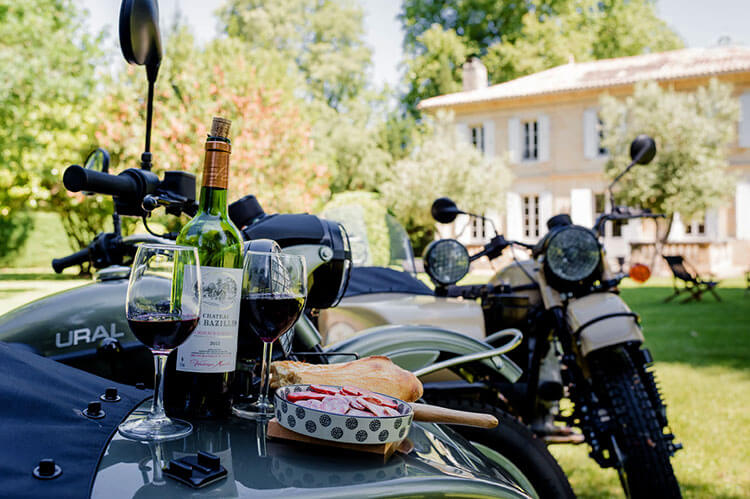
The tour also stops to enjoy a tasting of local specialties like cheese and charcuterie accompanied by, of course, wine. The sidecar tour is truly one of the unique things to do in Saint-Émilion and is a memorable end to your trip.
The 90-minute sidecar motorcycle tour is available daily from April – October. Advance booking is required.
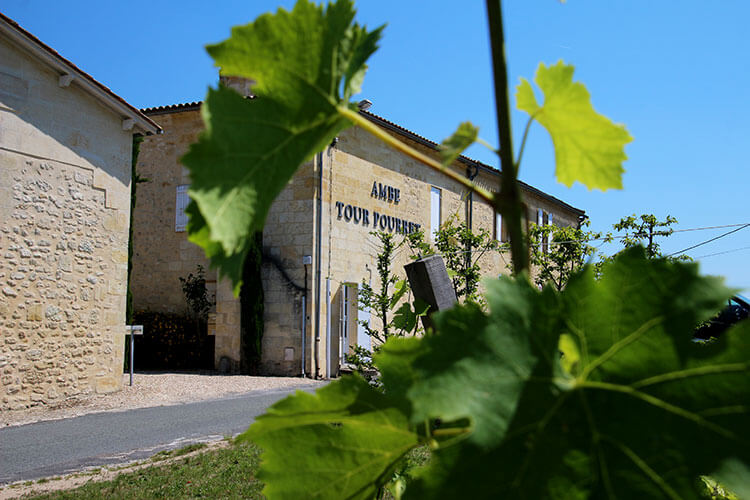
Sunday Brunch in the Vineyard
If you happen to be visiting Saint-Émilion on the first Sunday of the month from June to October, you won’t want to miss the Sunday brunch at Château Ambe Tour Pourret. Each month is a different themed brunch with a visit of the family-owned château after.
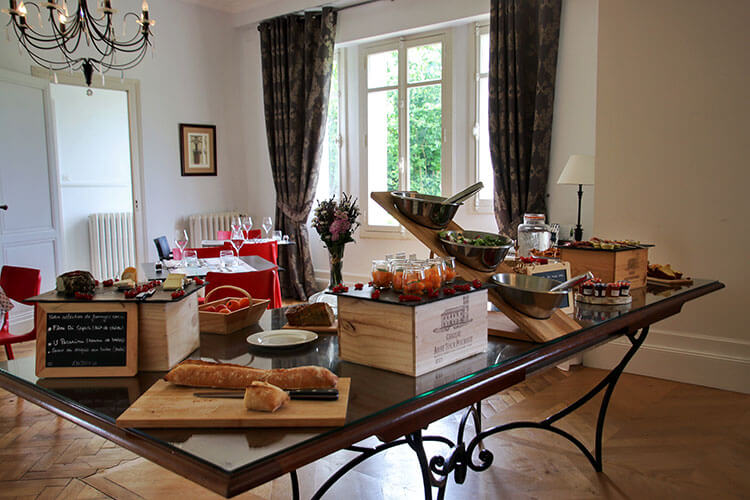
The brunch has two seatings at either 11am or 1pm and includes a buffet with various pastry, salads, quiche and tarts, fruit, cheese and charcuterie. There’s also a menu of cooked-to-order egg dishes that you select from. Coffee, tea or hot chocolate and juice are included. You can also choose a glass of Château Ambe Tour Pourret’s sparking Bordeaux crémant in white or rosé.
Sunday brunch is available on the first Sunday of each month from June – October. Advance booking is required and reservations can be booked online.
Know Before You Go
You might also want to rent a car to easily discover châteaux a little further afield or if you plan to stay at a vineyard accommodation.
We are ambassadors of Saint-Émilion in an ongoing partnership with Saint-Émilion Tourisme in order to bring you this story. However, Bordeaux Travel Guide maintains full editorial control of the content published on this site. As always, all thoughts, opinions, and enthusiasm for travel are entirely our own. This article contains affiliate links. When you book on Viator, Trainline or Rue des Vignerons through our affiliate partner sites, we earn a small commission at no additional cost to you.

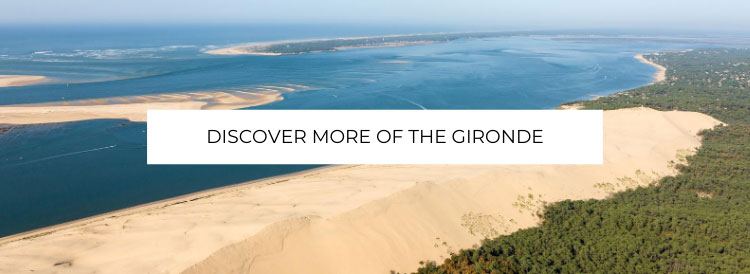
Leave a Reply